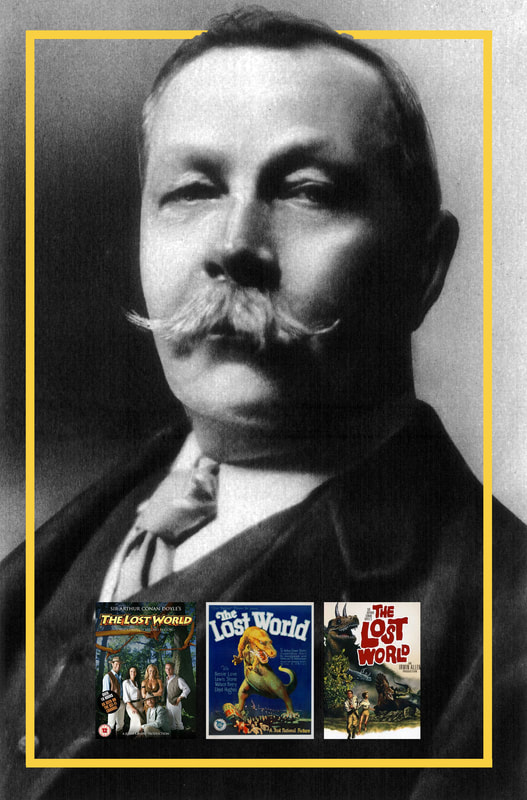Well, nothing directly, other than perhaps being the finest working example of ‘deductive reasoning’ available to mankind. And – now that I think of it – Star Trek: The Next Generation’s Commander Data kinda/sorta worshipped the character, and his idolatry was even featured in an episode or two of the original program. And – now that I think even a bit further – there was a short-lived derivation of the character in animated fashion that brought him front-and-center to the future: it was called, aptly, Sherlock Holmes In The 22nd Century, and it lasted a glorious 26 puzzle-filled episodes.
No, what I was initially ruminating over was that Sherlock Holmes’ creator – Sir Arthur Conan Doyle – has never quite been given the measure of respect owed in genre circles … as one of his seminal properties The Lost World perhaps pioneered not only a franchise as well as an entire reasonably popular sub-genre to all of Fantasy. And, yes, I bring this up because those of you who’ve already checked out today’s citation page for May 22nd know full well that Doyle was born on this day all the way back in the year 1859.
So … only the happiest of birthday wishes go out to the scholar, physician, and author. Here’s hoping that wherever he still might exist in the wide, wide hereafter he’s reading this humble post and smiling.
But … back to his The Lost World, for a moment …
According to Wikipedia.org, The Lost World was first published in serialized format between April and November of 1912, introducing such characters to Fantasy as Professors Summerlee and Challenger, Lord John Roxton, and Edward Malone. For those of you who haven’t read the novel, the whole affair begins with a challenge: Challenger has been to the ‘lost world’ – a place in deepest, darkest Africa where creatures of the Prehistoric Era still exist – but is being scoffed at by his fellow academics who insist any such place is possible. Never one to be laughed at, Challenger puts his money where his mouth is, offering to lead an expedition – along with a few of his significant naysayers – to show them his proof. The trip not only confirms the place’s existence, but the group brings back evidence (a Pterodactyl and some diamonds) that makes them heroes and extremely wealthy men, at that.
As an inspiration, The Lost World has enjoyed a few significant film adaptations, along with further direct-to-video interpretations and even a few television series to boot. The book’s Wikipedia.org page also denotes that there have been several radio (drama) adaptations that have explored and expanded on events Doyle originally imagined over a century ago, proving that good stories never go out of style. For what it’s worth, the Australia-produced The Lost World television series (which lasted three seasons) has been dismissed as being a somewhat campy rendering, but taken in the spirit of putting a serialized action drama through its proper paces for TV audiences I think it’s still an interesting diversion.
Though he’s no longer with us – having passed away on July 7, 1930, from an apparent heart attack – Doyle’s work continues to inspire creators and audiences around the world. I’d venture to guess that’s he’s far more well known for the escapades of his singularly intelligent detective, and there’s nothing wrong with that. Being one to champion All Things Genre, I thought I’d pen a quick reflection to remind readers that we owe him as much a debt as does all of literature for dabbling in our realm in such a huge, huge way.
As always, thanks for reading ... and live long and prosper!
-- EZ
Important SciFiHistory.Net Links:
A Review Of 1925's The Lost World


 RSS Feed
RSS Feed